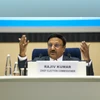Chief Election Commissioner (CEC) Rajiv Kumar, who will demit office on February 18, days after the results of the Delhi Assembly polls are declared on February 8, on Tuesday flagged the need for “accepted and legal answers” to curb the announcing of “freebies” by political parties during election campaigns.
At a press conference to announce the schedule for the polls, the last election he will supervise before demitting office, Kumar also batted for remote voting to ensure that India’s 300 million “missing voters” exercise their right to vote.
He supported the proposal for replacing booth-wise counting of votes with the “totaliser system” of counting of votes to prevent disclosures of voting patterns at a particular booth.
With the Union Budget slated to be presented on February 1, Kumar said the Election Commission would write to the Cabinet secretary, conveying to him that no Delhi-specific provision could be made in the Union Budget because that might disturb the level playing field.
On the issue of freebies, the CEC said, “Our proforma is on our website. It is high time it was accepted and legal answers were found but our hands are tied at the moment because the matter is sub-judice.”
In October 2022, the Election Commission had proposed amending the Model Code of Conduct to make it incumbent on political parties to include in their respective manifestos the financial ramifications of their promises. It had sought responses from political parties on the issue and shared a proforma for the purpose.
Kumar said a three-judge Bench of the Madras High Court had earlier ruled that freebies were not “disallowed”.
Also Read
“What is freebie for me may be an entitlement for someone else,” the CEC said. The CEC conceded it was difficult to define a “freebie”.
Kumar, however, added the electors had the right to know the state’s fiscal health when political parties made such promises, the cost of rolling out the promise, the state’s debt-to-GDP ratio and how much it would need to borrow and interest that it would have to pay. “We cannot mortgage the future of future generations, this is a very serious issue,” he said.
As for the challenges that India’s electoral system faced, Kumar said polarisation during poll campaigns could leave scars that might be ever-lasting. He urged political parties to ensure that boundaries were not crossed. “Aggression during campaigns sows seeds of impatience and younger generations are weaning away from elections,” he said.
The CEC also rebutted the Opposition’s recent criticism over the election process in Maharashtra. He said after the Supreme Court mandated in 2019 that five VVPATs (voter-verified paper audit trail) must be counted from each Assembly constituency, over 67,000 VVPATs had been checked, and 45 million (VVPAT) slips verified.
“Not even the difference of one vote has been found with the new machines since 2019,” Kumar said.
On his retirement plans, Kumar said he planned to head to deep Himalayas to “detoxify” himself, for solitude and self-study. A 1984-batch IAS (Indian Administrative Service) officer from the Bihar/Jharkhand cadre, Kumar reminisced attending a municipal school where classes were held under a tree.
“I started learning ABCD in the 6th class. We carried a slate and sat under a tree to study. I want to go back to those roots and teach such children,” he said. Delhi elections on Feb 5, counting on Feb 8
Polling for all 70 assembly seats in Delhi will be held on February 5. Chief Election Commissioner Rajiv Kumar said the Commission has “deliberately kept polling on a Wednesday”, that is mid-week, “so more people come out to vote”. Polling for the Delhi Assembly elections took place on a Tuesday in 2020 and recorded a turnout of 62.55 per cent.
Bypolls of two assembly constituencies — Milkipur in Uttar Pradesh’s Ayodhya district and Erode in Tamil Nadu – will also be held on February 5.
)